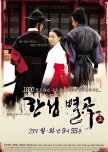A show that stands the test of time
Conspiracy in the Court is an 8-episode series set in the last days of King Jeong Jo’s reign. This mini sageuk turns out to be so special I swear I’ll remember it forever.
The show starts with a serial murder on the streets of Joseon and ends with the revelation of a horrifying secret inside the palace. It is a wonderful blend of action, thriller, mystery and romance, while remaining strong in both plot and character development. At 8 episodes, the twists and turns of a fast-paced plot is more than enough for a thrilling experience. What’s impressive is that each event propelling the plot also adds nuance to the characters, down to the minor ones. Everyone is fleshed out in a natural and almost nonchalant manner, so when a momentous decision triggered a plot twist, I already learned everything necessary to explain the actions of all involved.
Such detailed characterization is no small feat considering each character struggled with both internal conflicts and external obstacles. Some conflicts at the core of the show are conservatives vs progressives, hope vs reality, (familial/romantic) love vs duty. Imagine what miracles (or tragedies) occurred when these characters interacted and influenced the plot. Some had clashing objectives. Some shared goals but chose different execution. Then things happened, people evolved and alliances changed. At the end, two unions emerged on the opposite sides of history. History already declared who lost, but what was left of the losers?
Conspiracy in the Court, which aired 14 years ago, was a forgotten show of the 2000s. In my heart, though, it proudly stands the test of time. I’m so so impressed with the people who made this show. How did they build a plot that seamlessly weaves action, mystery, philosophy and romance? How did they write beautiful monologues and dialogues? How did phenomenal actors (like Ahn Nae Sang) breathe life into powerful speeches that fully embody their characters? It’s heartwarming to know there are people who possess this much creativity and willingly work hard to share their works with the world. This is not the kind of show to sit back and enjoy, more like fasten your seatbelt, stare at the screen and immerse yourself in the despair of unsolvable conundrums. But overall I’m happy with the torturous (sorta) experience, and will patiently wait until I get to experience these feelings again with another special show.
The show starts with a serial murder on the streets of Joseon and ends with the revelation of a horrifying secret inside the palace. It is a wonderful blend of action, thriller, mystery and romance, while remaining strong in both plot and character development. At 8 episodes, the twists and turns of a fast-paced plot is more than enough for a thrilling experience. What’s impressive is that each event propelling the plot also adds nuance to the characters, down to the minor ones. Everyone is fleshed out in a natural and almost nonchalant manner, so when a momentous decision triggered a plot twist, I already learned everything necessary to explain the actions of all involved.
Such detailed characterization is no small feat considering each character struggled with both internal conflicts and external obstacles. Some conflicts at the core of the show are conservatives vs progressives, hope vs reality, (familial/romantic) love vs duty. Imagine what miracles (or tragedies) occurred when these characters interacted and influenced the plot. Some had clashing objectives. Some shared goals but chose different execution. Then things happened, people evolved and alliances changed. At the end, two unions emerged on the opposite sides of history. History already declared who lost, but what was left of the losers?
Conspiracy in the Court, which aired 14 years ago, was a forgotten show of the 2000s. In my heart, though, it proudly stands the test of time. I’m so so impressed with the people who made this show. How did they build a plot that seamlessly weaves action, mystery, philosophy and romance? How did they write beautiful monologues and dialogues? How did phenomenal actors (like Ahn Nae Sang) breathe life into powerful speeches that fully embody their characters? It’s heartwarming to know there are people who possess this much creativity and willingly work hard to share their works with the world. This is not the kind of show to sit back and enjoy, more like fasten your seatbelt, stare at the screen and immerse yourself in the despair of unsolvable conundrums. But overall I’m happy with the torturous (sorta) experience, and will patiently wait until I get to experience these feelings again with another special show.
Vond je deze recentie nuttig?





